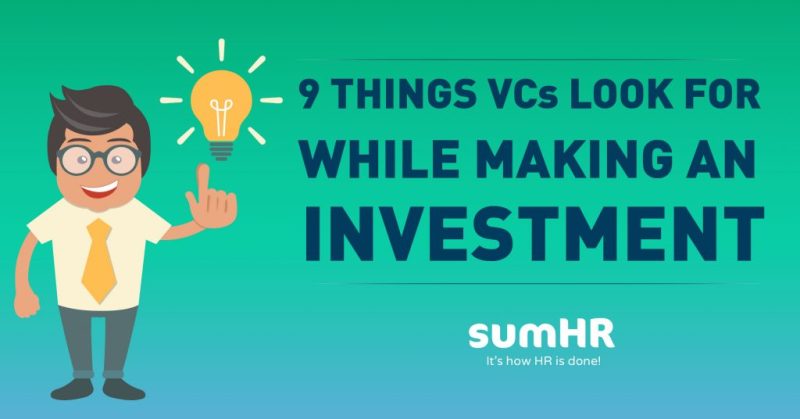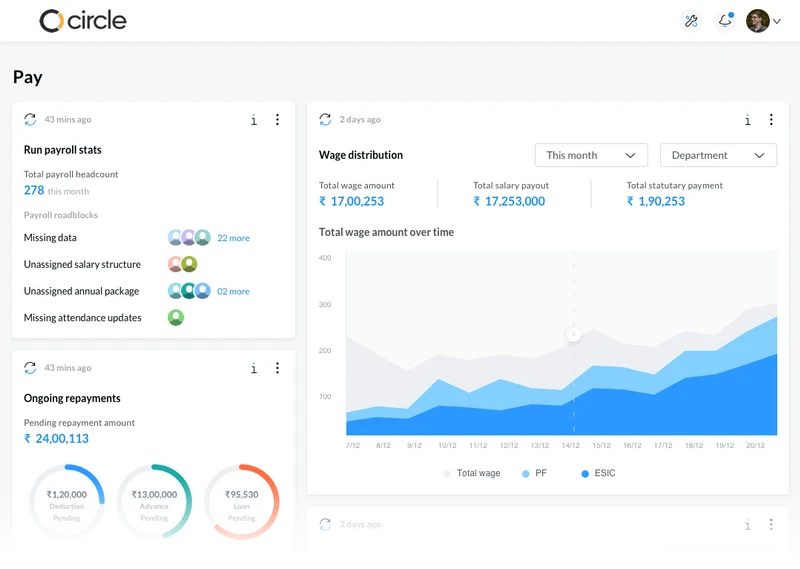VC funding has been glorified over the past 10 years for their contributions in the startup work. Over 2500 Indian startups have been funded since 2015, 1st quarter of 2018 alone has had $1.17 Billion investment in 196 deals. At this point, competition for new businesses in every sector is very high and so is the case with VC fundings. VCs are not just looking for a “good idea” anymore. They want to know about startups’ market size, core leaders, team strength, sustainability, profitability, competitors and a lot more, before making a decision to invest in a venture.
So here we have a list of 9 things VCs look for in startups before making an investment –
1. Strong leaders & quality team

There are quite a few “unique” ideas, some of which are ahead of their time but they don’t see the light of day because they don’t have a strong team to work towards execution. A startup’s idea can be very simple or already existing for all you know but it would still find enough VCs interested to invest in it. How? Because VCs closely look at the leaders and their core team who are going to deliver on the presented planning, before they make their mind to sign a deal. As they say, it’s not the business, it’s the people VCs invest in. A strong team is one which is invested in the company’s vision from the beginning, one which can sustain in the company’s difficult times and is capable to give and take advice when required.
2. Part of a sustainable market

One of the things VCs look for are startups that can sustain in a long run. VC funds startups that generate returns more than their investment, therefore they focus on investing in products or services that would show longevity. If your idea has a short shelf-life, you need to think of ways to evolve your project and stay in the game longer. If you’re entering a me-too market where enough startups are already selling your product/service and they have already had a strong brand recall amongst customers, then you need to have a smart sustainability plan to survive the competition. If your idea is ahead of its time, then you will find it hard to raise a VC funding given that the risk in that market would be too high.
3. Where startups invest their investment

Your presentation must not only include your idea, market conditions, TAT for profits but also how and where you plan on burning VC funds. This is an important aspect every VC wants to know. How many funds do you currently have and how long would their invested funds last in your operations. Show them a detailed plan on how best you will use their money to grow your venture soon enough to get the promised returns.
4. Have a startup that solves a problem

The idea isn’t everything, but it is the first thing every VC wants to know before you further explain your POA because that’s where it will all start. Come to think of it, startups that are doing great in spite of tough market conditions are those that focus on solving problems. If your work is focused on an inefficient market, then you are more likely to attract VCs attention. These are startups that attract big markets and therefore they’re able to sustain longer. VCs want to know your target market and more importantly how big that market is. Why? Because VCs are investing to help you grow and any startup in a big market will support that growth. Big markets have more avenues to multiple in the later stages and are less likely to fluctuate.
5. Thorough research and market knowledge

This one probably goes without saying but one of the things VCs look for is if you’ve prepared a plan that covers all the aspects to showcase an all rounded business model. We have already established that having an idea is not everything, your understanding about target markets, already existing competitors, competitors’ USPs, reason customers prefer those brands over the others, your marketing strategy to change the course of buys’ behaviour, samples that show traction to your ideas, long term plan that shows a scale up for both your startup and the VCs profits, challenges you’re likely to face are some of the major aspect that VCs would be interested to know from you.
6. Prove your startup is a current market fit

No matter how early stage your startup might be, VCs wants to know how viable your model is when it comes to real life sales and operations. Before you approach the VCs for funding, if you have a functional current market for your product/service, there are better chances for you to raise investment. This would validate your idea with real time operations & buyers only to impress the VCs for funding.
7. Are your values & philosophies in-line with the VC’s

Before investing in any idea or startup, VCs look for management’s value and approach in the larger scheme of things. Some might only be interested in their share of profits and would support a startup that promises them high long term returns. Whereas, other VCs may take a well thought out approach to support startups from their past investments, in turn trying to create a market for their own ventures’ overall scalability. These philosophies can be a part of VC’s core value or from experiences from their earlier investments in similar markets. You may want to approach VCs who specialise in investing into ventures like yours, to increase your chances to raise funding as VCs tend to have an area of interest
8. Approach divers investors

Reach out to as many VCs in the market as possible for you to sell your idea and raise a number on the table. Even if that means you might be offered funds from VCs you aren’t very keen on partnering with. Creating a competitive scenario for VCs has its own perks. Not only will the fear of missing out nudge their competitive spirit to get on board with your idea. But will also help spread the word about your venture amongst the whos who of the startup ecosystem. Let the big guns take notice of who you are and what is your plan all about. Who ruled gambling only for the VCs? Let the tables turn in your favour and have them know you’re going to do this with or without them.
9. Level of competition

Indian startup market has witnessed a great number of “me-too” ventures. In 2018, Fintech startups are leading with 21.47% investment, followed by 17.91% in Enterprise Applications, 9.37% in Healthtech, 9.07% in Real Estate and 8.74% in Entertainment Tech, being the top 5 sectors that has raised major fundings for their startups. Given that, ventures in Consumer Services, Edtech, IoT & AI are still the newbies of the startup ecosystem. These statistics show that fintech being the highest invested sector also has the most businesses, making the competition very high. If you are a part of the me-too venture, you need to have a X-factor to impress the VCs enough in partnering with you.
Now that you know what are the different aspects VCs look for in startups, get going with your ideas and the cash flow in!







